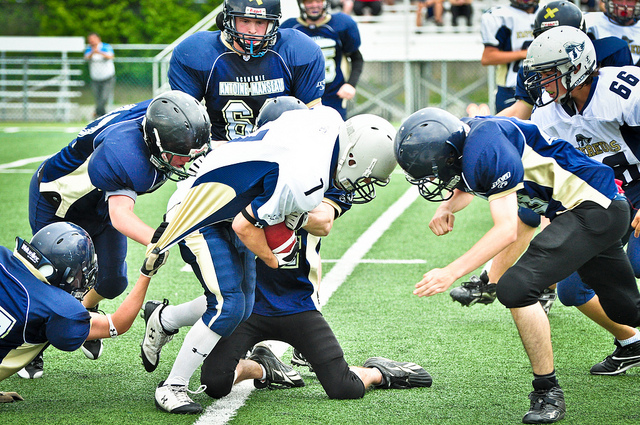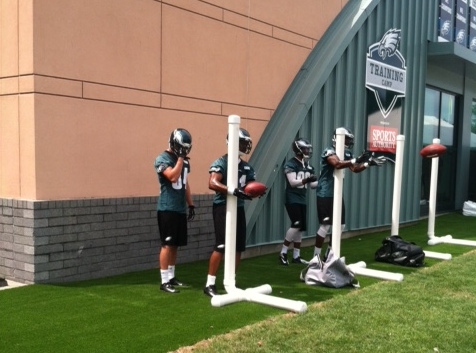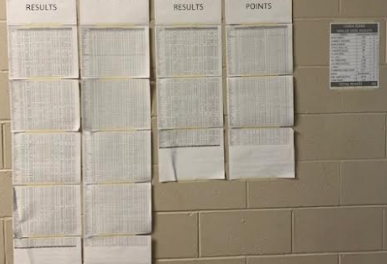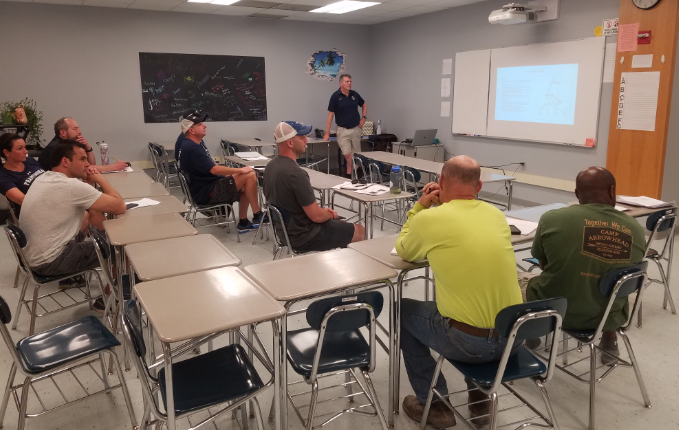Question: We didn’t make the playoffs, but have one regular season game to go. How do we keep them motivated to work and get better when the finality of the
season hits?
Every season many coaches find that there may be a struggle toward the end of the season to keep your practice intensity up. You feel it as a coach and I remember experiencing it as a player. It’s important to remember how you felt as a player so you can be able to adjust and adapt to your team’s needs.
Symptoms of Poor Practice Intensity
What does this look like to a team when your not having a great week? It means that when you are going through your drills, everything is slower or quieter then normal. Or maybe it is taking a long time to get the players going in a drill that they have been doing all season. Sometimes it could be players just not running around in practice like they used to. You may be tempted to get fired up and start yelling at the players for not caring. And they may not care like they used to either. But that isn’t an excuse to have a bad week of practice – just because you don’t feel like it we would all agree.
Some of this may depend on on how your season is going. If you haven’t won any games up to this point, they could be down about how their season is going. Maybe they just came off of a tough loss. Maybe they even came off of a great win, but expended so much energy that they are still coming down off the high of the emotion. There are a million reasons why your team could be slowing down, but either way, it is a tough issue to deal with and as a coach you want to find a solution because if you don’t, you might end up with an entire week of bad practices and we all know what that means going into your next game.
Responding To Practice Intensity
I think it’s fair to say that if you go down the road of reprimanding your team, they may respond to your talk or punishment (like extra conditioning). However, you may also be missing something that is causing them to slow down and this could be an important signal from your team that you don’t want to miss. If you are a coach who resorts to this kind of motivation every single time, your team will probably just get used to it and it will lose its effectiveness. You also run the risk of completely losing your team because they simply just don’t like to be yelled at and punished – they may feel like you are just a crazy coach!
Rest and Recovery During The Season
One reason that is commonly overlooked is that they could be struggling because they are physically exhausted. Stop and take a look at how long your season has been going. How long are your practices? Are you still heavily conditioning at this point? If you are, it probably won’t make too much of a difference because it’s too late to change their conditioning anyway at this point. It’s also said that “fresh legs win games.” If your players legs are tired and not getting the recovery they need, maybe your team needs to back off the conditioning. I have become much more sensitive to this every since I began coaching track sprinters. Physiologically, I have learned, that it takes a solid 48 hours for the human body to fully recover from an all out sprint or exercise. Knowing this has help me space out our heavy conditioning so we never do back to back hard conditioning days. I’d rather keep up a level of conditioning all week alternating low conditioning days with high ones…even the day before the game, so that we are fully ready but not overtired. To keep legs fresh but still fast, you focus more and more on speed and less on length of conditioning as you near your game day.
How Routine Effects Practice Intensity
Another reason that practices sometimes start to feel low on intensity is because the players are bored with the daily ritual. While it’s great to practice skills and drills repetitiously, after 6-7 weeks of the same drills and routine, almost anybody would struggle with lagging a little – especially a bunch of teenagers! Think about mixing it up a bit with the order of practice and even doing some “planned” surprise segments. Special teams and special situations are great to add in here and if you want to really get the team energized…make it a competitive match up.
I’ve also had a lot of fun making up new segments just for fun. Like a Backwards Indy Period where lineman do receiver and running back drills and the WR/RB/QB’s do a few OL drills. Or for 5 minutes we split the team up and play a “huge” game of touch football ..30 v 30 on the 25 yd line going in. Just fun stuff like that can really turn the atmosphere of your practice around. And all you are really sacrificing is 5-10 minutes.
Finally, I think it’s really important to start tapering your practices down as the year gets closer to the end. The closer you get to the end there’s less you can do in the terms of skill development anyway so it doesn’t make sense to keep hammering away at it when you really just need to perfect it. Fewer reps, as long as they are high quality are actually better then getting a lot of reps where the quality starts to suffer and bad habits can be formed.
Playoff Bound or Banquet Ready
Fortunately, if your team is playoff bound, the excitement and energy picks up pretty easily once you begin a playoff run. But if your not bound for the playoffs, there’s no reason you can’t still have great weeks of practice having fun playing the game of football! Make sure your attitude and team talks reflect this approach and your players will pick up on it. Think back also to the most fun times you had as a player because there may be some fun things you want to bring out to practice. I’ll never forget how special the last week of practice was for me as both a HS and College athlete. We had a special theme every day for the Seniors and took a few minutes at the end of practices to do some really memorable rituals like run the last lap around the field together, or take a final hit on the sled or tackle dummy. It’s memories like those that we all hopefully have that make football great forever!
Key Points To Talk About
Reasons to stay motivated to work should include many of the following:
- Focus on excellence..it’s who we are. Our circumstances don’t affect our performance. We are thermometers, not thermostats.
- Make every day, week, moment count. Because the future is just a whole string of nows. Stay focused in the moment – it’s how you achieve real improvement and growth.
- Memories – Your season ends sooner then later, the pads come off, the fans go home. Make this one count. As long as you have a practice or game left, there’s always a chance to make something great happen…insert motivational team example or story here!
- Remind and review season goals. How does what we do today accomplish that goal?
- Refocus on Weekly Game goals. One of the best reminders of a goal you want to accomplish is to make sure you see it or hear it daily. I set up my personal goals to be texted to me daily or pop up every time I open a new browser window. It can be really helpful to have some basic team goals that can be reviewed before, after and even during every game. These include simple goals like offensive points scored per game (ex. >21), defensive points allowed (<18), No big plays of +15yds allowed. No scores in the final 2min of each half or game. Win the turnover battle, etc.
Final Thoughts
However you end up addressing the intensity level of practices is a key responsibility of the coach in charge. By communicating and modifying the way practice is run, much of this problem can be addressed directly. Having a problem like this is also a good reminder that practice intensity is not something that can be ignored or not discussed until it becomes a problem. Our coaching philosophies should be addressing many of these key points regularly so that it’s not a new thing when things naturally slow down.
It’s also important to be flexible and have a finger on the needs of your team so you anticipate and adjust quickly.
“Polling your assistants thoughts can sometimes help, but the best way to get great feedback on how players are feeling is to ask them and watch them.”
Make sure you give them the trust and respect to get an honest answer from them about how their bodies are handling the stresses of the season. Football is a grind physically and mentally if we are not careful and especially towards the end of the season, many coaches make the mistake of not adjusting to their teams needs soon enough. Don’t make this mistake! Watch your team’s practice intensity and adjust practices as needed. Keep players fresh for a few great high intensity segments and short enough that they don’t start going through the motions just for the sake of practicing.






All great points! Good to know we are doing some of these things you point out. All very important.
I always found that intensity in practice was less when the players were physically exhausting and when they were having problems in school, at home, with girlfriends. I always helped to talk to them about the lack of intensity. It was surprising sometimes what they would tell us coaches!
That’s a great point…sometimes we don’t think of what else is going on with them outside of school that could be a factor.
Great article. Gave some great ideas.
Thanks Coach!